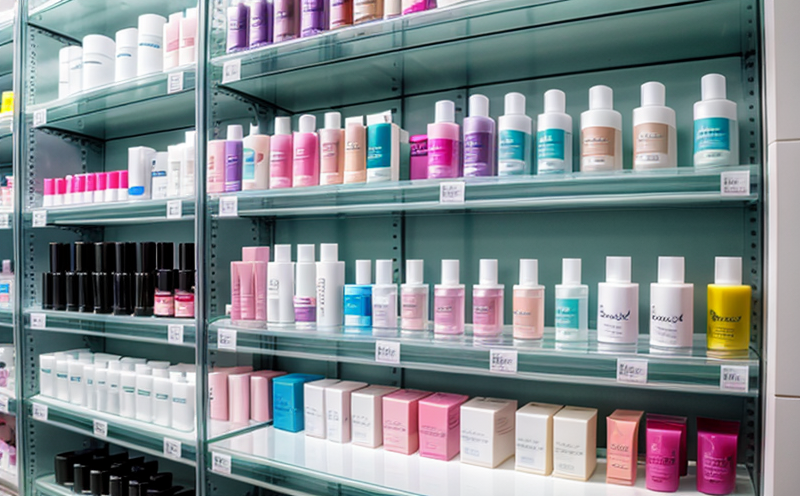Vitamin C Stability Testing in Cosmetic Creams
The stability and shelf life of cosmetic formulations are critical factors that determine consumer satisfaction and product longevity. Vitamin C, also known as L-ascorbic acid, is a key ingredient in many skincare products due to its potent antioxidant properties and ability to brighten the skin. However, vitamin C is highly susceptible to degradation under various environmental conditions such as light, heat, oxygen, and moisture. Therefore, it's essential to conduct thorough stability testing on cosmetic creams containing vitamin C to ensure their efficacy and safety over time.
Stability tests assess how a formulation behaves over extended periods in different environments. For vitamin C-containing cosmetic creams, these tests aim to evaluate the chemical changes that occur when exposed to light, temperature fluctuations, humidity, and other factors that could influence its stability. The primary goal is to predict whether the product will maintain its desired properties throughout its shelf life.
The testing process involves several steps. First, samples of the cosmetic cream are prepared according to standard procedures outlined in relevant international standards such as ISO 25098 and ASTM D7461. These guidelines ensure consistency across laboratories performing similar tests globally. Next, the creams are subjected to controlled conditions designed to mimic real-world scenarios where they might be stored or used by consumers.
Once prepared, the samples undergo rigorous testing using advanced analytical techniques like high-performance liquid chromatography (HPLC), Fourier transform infrared spectroscopy (FTIR), and differential scanning calorimetry (DSC). These methods allow for precise measurement of changes in vitamin C concentration, molecular structure, melting point, and other physical properties. By comparing the results at various time points during the test period, researchers can determine the rate of degradation and establish optimal storage conditions to maximize product life.
It's important to note that stability testing is not just about measuring the loss of vitamin C; it also involves evaluating potential side effects resulting from decomposition products. For instance, certain breakdown compounds may be more reactive than intact vitamin C itself, posing risks if they accumulate in significant quantities within the formulation. Thus, comprehensive analysis helps identify any hazardous byproducts early on so that corrective measures can be taken.
The findings of these stability tests are crucial for several reasons. They inform decisions regarding ingredient selection and formulation development, helping manufacturers choose the most stable form of vitamin C suitable for their products. Additionally, they guide recommendations on optimal packaging materials and storage guidelines to extend shelf life while maintaining product quality. Furthermore, reliable data from such tests support compliance with regulatory requirements set forth by organizations like the European Union Cosmetics Regulation (EC No 1223/2009).
In summary, conducting thorough stability testing on vitamin C-containing cosmetic creams ensures that these products remain effective and safe for consumers over their intended shelf lives. This process involves meticulous sample preparation, exposure to controlled environments, advanced analytical techniques, and careful interpretation of results. Ultimately, it plays a vital role in enhancing product performance, protecting consumer health, and maintaining brand reputation.
Why It Matters
The stability of vitamin C in cosmetic creams is paramount because this essential antioxidant has numerous benefits for skin health. When properly stabilized, it helps protect the skin from environmental stressors like pollution and UV radiation by neutralizing free radicals. This protection can lead to improved skin tone, reduced hyperpigmentation, and a more youthful appearance.
- Enhanced Antioxidant Defense: Vitamin C acts as an effective antioxidant, helping to shield the skin from oxidative damage caused by harmful environmental factors.
- Promotes Collagen Production: By inhibiting tyrosinase activity, vitamin C encourages collagen synthesis which is crucial for maintaining firm and supple skin.
- Reduces Dark Spots and Uneven Skin Tone: Its brightening effects make it a popular ingredient in treatments aimed at evening out skin coloration.
However, if not adequately protected against environmental stressors during production or while being stored on shelves, vitamin C can degrade rapidly leading to reduced efficacy. This degradation could result in less effective protection for the user and potentially even harmful impurities forming due to decomposition reactions. Therefore, ensuring proper stability through rigorous testing ensures that consumers receive maximum benefit from their purchases.
Why Choose This Test
- Comprehensive Evaluation: Our comprehensive testing evaluates not only the degradation of vitamin C but also the formation of potentially harmful byproducts, providing a holistic view of product integrity.
- Industry Expertise: Leveraging our team’s extensive experience in cosmetic science ensures accurate and reliable results that meet global standards.
- Customized Solutions: We offer tailored testing solutions to suit the specific needs of your formulation, ensuring no stone is left unturned when it comes to quality assurance.
- State-of-the-Art Facilities: Equipped with cutting-edge equipment including HPLC systems and DSC instruments, we provide precise measurements essential for accurate interpretation of results.
Competitive Advantage and Market Impact
By investing in thorough stability testing for vitamin C-containing cosmetic creams, companies can gain significant competitive advantages. Consumers increasingly demand transparency regarding product ingredients and performance claims. Demonstrating robust stability data enhances brand credibility and trustworthiness among customers.
Moreover, strong stability indicates superior quality which translates into better market reputation and increased customer loyalty. Companies that consistently deliver high-quality products are more likely to attract repeat business and expand their market share. This is particularly true in the highly competitive cosmetic industry where maintaining product efficacy over time sets one apart from competitors.
Regulatory compliance also plays a crucial role here. Meeting stringent regulations helps avoid recalls or legal issues that could damage brand image and financial stability. By adhering to guidelines like those provided by the European Union Cosmetics Regulation, companies ensure they remain compliant and up-to-date with evolving standards.





